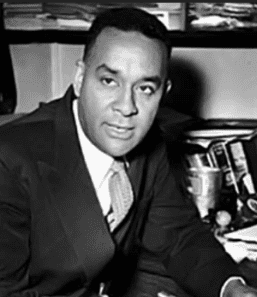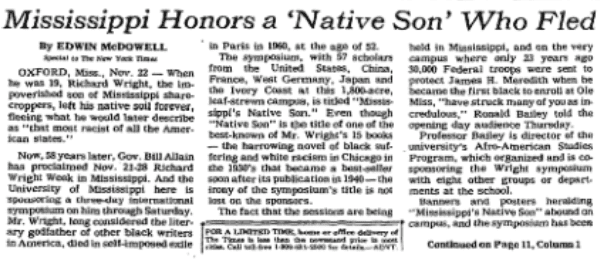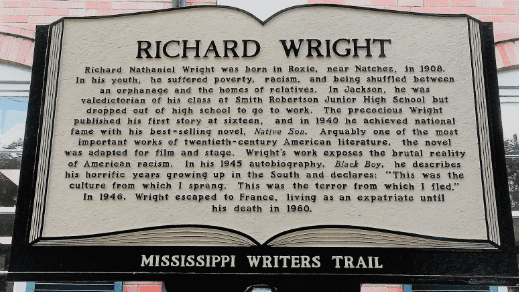- With millions of copies of his books, awards in his honor, and historical markings, it is evident Wright’s legacy did not die with him. The impact of Richard Wright, the Native Son, lives on.
Mississippi certainly hosts a plethora of iconic writers, and Richard Wright is among the most notable.
Richard Wright was born on Rucker plantation on September 4, 1908, which is now part of Natchez State Park. His father, Nathan, was a sharecropper, and his mother, Ella, was a teacher. Wright became a figurehead in American literature with his powerful depictions of the racial and political environment during his lifetime. Wright’s work, both in literature and activism, has left an immutable impact on American society.
Poverty and racial segregation in the Deep South marked the early years of Wright’s life. He faced the harsh realities of discrimination, lack of opportunity, and poverty as a poor black boy born in the South. Wright was beaten in his childhood for numerous reasons; he accidentally burned down his family’s home. He spent time in an orphanage and moved several times before settling with his grandparents in Jackson at the age of 12. It was there he finally finished more than a year of schooling, and he graduated valedictorian from Smith Robertson Junior High School. He attended Lanier, a black high school in Jackson, but wasn’t able to finish because he had to work.

Reading and writing became Wright’s escape, and he devoured literature with an intense longing to learn. He moved to Memphis on his own at the age of 17, and eventually, his family joined him.
Wright began his writing journey when he relocated to Chicago in 1927. There, Wright thrived in the culture of The Windy City. Even in the North, Wright still found racism and inequality, both of which fueled his writing efforts.
Breakthrough with “Native Son”
Wright published his groundbreaking work Native Son in 1940. Not only was Native Son a huge success, but its protagonist, Bigger Thomas, became an iconic symbol of what Black Americans faced in the throes of segregation and rampant inequality.
Just five years later, Wright released his autobiography, “Black Boy.” The autobiography told raw stories of his own life experiences, highlighting what it was like for him as a young black man during the Jim Crow era and finding his voice as a writer.
Wright’s two works launched him into the limelight in the international literary scene. He was the center of literary discussions worldwide, with his works translated into numerous languages. Wright utilized this notoriety to advocate for equality and social justice.
The Native Son and the Activist
Wright used his platform to shine light on social issues in “The Outsider” and “The Long Dream.” Eventually, he left the United States and lived in Europe to get away from continued racial struggles in the 50s. Even though he was physically separated from the issues, Wright didn’t stay silent and continued to speak through his work from afar.
Wright died on November 28, 1960, but his work is immortal. Wright’s work challenging social injustice as the social norm has left a mark on the world that cannot be erased.
Remembering Wright in Mississippi
Wright’s impact on the world, Mississippi included, couldn’t be argued, even though he left the state. In 1985, Governor Bill Allain named the first Richard Wright Week, which took place November 21 to 28. It was celebrated with a symposium at the University of Mississippi, which attracted students from all over the world. The New York Times published an article about the celebration, but the author of the article, Edwin McDowell, was very insistent on pointing out the irony of Mississippi celebrating Wright despite the fact he left the state.

Richard Wright is memorialized in many ways in the Magnolia State. Wright’s childhood home at 20 Woodlawn Drive in Natchez, Miss. is a historic landmark adorned with a historic marker. Richard Wright has been on the Mississippi Writers Trail since 2020 when a marker was put up at Judge George W. Armstrong Library in Natchez.

The sign was erected with some blowback, though; the Natchez Democrat ran an opinion article saying the marker shouldn’t be at the museum for a myriad of reasons, including the fact that had the library been there in Wright’s lifetime, he would not have been permitted access due to segregation laws.
The Natchez Literary and Cinema Celebration, along with Copiah-Lincoln Community College, has honored numerous writers with the Richard Wright Literary Excellence Award. This award, named for the author, honors writers with a body of work who are living and have strong Mississippi connections. This award was established in 1994 and has been awarded to many Mississippi greats such as Eudora Welty, Shelby Foote, Elizabeth Spencer, Richard Ford, John Grisham, Curtis Wilkie, and more. The NLCC also honored the 100th anniversary of Wright’s birth by dedicating part of Highway 84 as the Richard Wright Memorial Highway.
With millions of copies of his books, awards in his honor, and historical markings, it is evident Wright’s legacy did not die with him – the impact of Richard Wright, the Native Son, lives on.
Read original article by clicking here.

